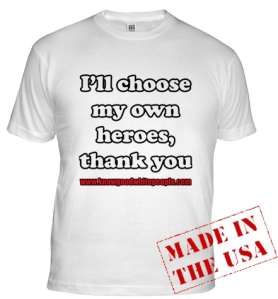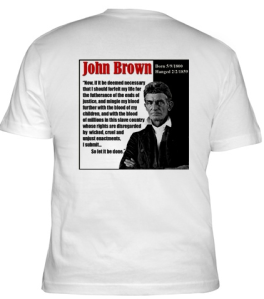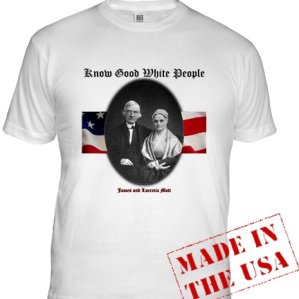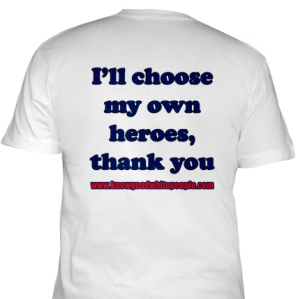
Corporations all over the United States use "Indian" names, and companies have logos and trademarks with "Indian" themes. From the blue-eyed woman in "Indian Princess" garb on the door of the trucks of the "Navajo" trucking company to the "Indian princess" depicted on the Land 'O Lakes butter packages, stereotypical images of Native Americans are everywhere.
Many corporations add insult to injury by not only appropriating Native images and traditions, but scrambling them in the process. Tuscarora Yarns, for example, has chosen to represent itself with a logo that is a stereotypical image of a Native American in a Northern Plains Indian eagle feather headdress, often misnamed a "war bonnet." My grandfather --a full blood Cherokee and Tuscarora -- was born and raised in North Carolina, the traditional homeland of both these Native peoples. Knowing this, I educated myself about everything I could that related to both nations. Anyone else who took the trouble to do so would know that Tuscarora people did not wear this type of regalia.
The above image, a seemingly warm, generous, and racially feminized offering of butter, has been emanating from Land O'Lakes products for over eighty years now. I'm embarrassed to admit that when I was a kid, I felt attracted to her.
My current embarrassment about that boyhood attraction arises in part from my adult understanding that this buttery "Indian maiden" is just one example of the white supremacy that permeates American life and culture, embedding itself into the most seemingly innocent practices and products. It's also part of a long, disgusting, and ongoing tradition of such advertising imagery, both here and in Europe.
The company that makes this butter, along with other dairy products, is now called Land O'Lakes, Inc., and it's been functioning with "Land O'Lakes" in its name since 1926. The "now-famous Indian maiden," as their web site continues to identify her, adorns all of their products.
I'd be willing to bet that this company has fended off numerous buyout attempts by food-giant conglomerates, and I'd also bet that the continuing and profitable appeal of this "Indian maiden" is a primary reason they've been able to afford staying independent. The trouble is, despite the wholesome, nostalgic aura that draws many consumers to buy Land O'Lakes products, the "appeal" of their "Indian maiden" is a racist one. To whom, exactly, does she appeal, and not appeal?
Like the hoary fantasies of "Indians" and "Pilgrims" sharing with quiet reverence the first "thanksgiving," the Land O'Lakes butter maiden helps white Americans sidestep and repress the horrific realities of what white Americans have done to Native Americans. It also invites continued white oblivion to contemporary Native American misery, by offering instead a warm, fuzzy image, an image that is also oddly sexist, in that it's both sexually alluring and warmly maternal (who knows, maybe that combination explains my pubescent attraction to her).
I'm considering a letter of protest about this to Land O'Lakes' headquarters in St. Paul, Minnesota (letters are often tougher to dismiss than emails). I'm also wondering, though, if that would really do much good. After all, not many other consumers seem to object to her ongoing existence in the dairy section. And if most of those few who object are actual Native Americans, like H. Mathew Barkhausen III, Terri Andrews, Rob McDonald, or a blogger who calls himself the Pudgy Indian, well, that's still just a few, right? And they're just "Indians," right? Or so the white thinking seems to go on these matters. But maybe, adding my voice of protest, and yours, would help to send the butter maiden into the retirement that she's been deserving for a long, long time.
When I discovered on the Land O'Lakes web site that the "Prestigious Chef's Council" had endorsed their "Indian" butter, I thought for a second that the company had managed to find a willing council of Native American "Chiefs" somewhere. But, no, it's actually just a "chefs" council (and from what I can tell, all white ones).
And then when I read on another site that Land O'Lakes was announcing their first packaging change "in 86 years," I thought, "Finally! Another purveyor of commodity racism has seen the light." But no, I was wrong again--the only change is the shape of the package, to better conform with the different shapes in which butter has long been sold in some western American states.
"Commodity Racism," a useful term here, was coined by Anne McClintock (in her book Imperial Leather, which is named after a somewhat differently risible product--check out the cheesy, diversionary appeal going on here). McClintock charts the movement of racism during the Victorian era from the realms of science to those of manufacturing, particularly in advertising. The result was early ads like this one, which shows, as McClintock describes it, "an admiral decked in pure imperial white, washing his hands in his cabin as his steamship crosses the threshold into the realm of empire":

Or this one, which speaks for itself in terms of which race embodied connotations of cleanliness and purity, and which embodied the opposite (like you, I can't make out the words below the image):

Unlike Land O'Lakes butter, Pears Soap (which is still made by the British Company that first sold it in in 1789, a date that makes it the oldest brand-name in existence) is now sold in less objectionable ways. Their web site offers an interactive photo album that allows you to flip through examples of their previous advertisements; it's no surprise that the many racist, empire-boosting ads have been scrubbed, as it were, from the record.
As an American product, the obstinately old-fashioned Land O'Lakes butter maiden is part of a distinct tradition of commodity racism in the grocery store, a tradition that mostly consists of images that I'd rather leave in the dustbin of history than reproduce here. Still, a few are worth showing, by way of contextualizing not only the butter maiden, but also other racist images that still end up in today's grocery carts.
Such ads have appealed primarily to white people, by playing up to prevalent stereotypes about other people, as in this bizarre conjunction of text and imagery, for an oddly named brand of sweet potatoes:

Many other images of African Americans depicted them eating stereotypical foods, and sporting completely (and inaccurately) black skin and grotesquely exaggerated features. The latter are echoed in this ad* for American Apparel (click on it for a larger version):

But back to the particular kind of image that we still see in the butter maiden, that of iconic individuals who helped to sell food. There's Aunt Jemima, whose image still sells syrup, and who looked like this in 1899:

Like the butter maiden, Aunt Jemima has yet to be retired, though she has been "updated"; today she looks like this:

There's also the Frito Bandito. Fortunately, he has been retired:
So why am I filling up my white-folks blog with racist images of non-white folks?
Because such images are much more about white people, and especially white fantasies, than they are about actual non-white people. They conjure up thoughts and feelings of warmth, or humor, or security, but they do so by conjuring up racist thoughts, sensations, and even fears about subjugated people.
If we can afford to buy more food than the bare necessities to survive in terms of nutrition--if we're in a position to pick and choose--then we're also buying, and "consuming," the connotative aura that's added to the foods by the images placed on them. These images have much more to do with why we buy products than we often realize, and their effects in reinforcing racist ideas are also stronger than we often realize.
For me, the issue is quite simple--we should boycott these kinds of foods, and all such commodity racism should be retired.
And don't even get me started on the racist imagery that infests all levels of American sports.
(Contact info for companies listed above: American Apparel, Land O'Lakes, and Quaker Oats, the maker of Aunt Jemima products)
*As several readers of this post and this one have noted, this image isn't an "ad," but rather a magazine article; American Apparel's distancing of sorts from the image appears on their web site here.
UPDATE: The more things change . . .

Boston.com: "A box of Obama Waffles is seen in Washington, Saturday, Sept. 13, 2008. A vendor at a conservative political forum was selling boxes of waffle mix depicting Democratic presidential candidate Barack Obama as a racial stereotype on its front and wearing Arab-like headdress on its top flap. The product was meant as political satire, said Mark Whitlock and Bob DeMoss, two writers from Franklin, Tenn., who created the mix and sold it for $10 a box at the Value Voters Summit sponsored by the lobbying arm of the Family Research Council."







